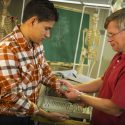Madison ranked top metropolitan area in U.S. for STEM graduates
The Brookings Institution on Tuesday recognized Madison, Wisconsin, as the number one metropolitan area in the U.S. for science, technology, engineering and mathematics (STEM) college graduates — the workers most likely to support the advanced industries that are driving the U.S. economy.
In the Madison area, home to the state’s flagship University of Wisconsin campus, 26 percent of college graduates earned degrees in STEM fields. That’s higher than the national average (15 percent) and even outstrips the world leader in STEM graduates, Finland (22 percent).
Among the Institution’s findings:
- Sixty-five percent of U.S. job growth since 2010 came from advanced industries that often partner with research institutions such as UW–Madison, and employ an educated workforce.
- Combined, these industries — which include energy production, scientific consulting, pharmaceuticals and 47 other segments — generated $2.7 trillion, or roughly 17 percent of U.S. gross domestic product in 2013.
- The advanced industry sector has grown by 5.4 percent annually since 1980 — 30 percent faster than the U.S. economy as a whole. Workers have seen actual wage growth, with salaries rising by 63 percent between 1975 and 2013 (after adjusting for inflation), compared with 17 percent growth outside of the industries. The average job in the advanced industry sector paid $90,000 in 2013, more than twice the average wage for U.S. workers on the whole.
Yet the report cautions that the long-held advantage the U.S. has had in these industries is in jeopardy. It calls for renewed cooperation and investment by state and local leaders and the private sector.
“Today, after decades of offshoring and disinvestment, America’s advanced industry clusters are in too many places thin or eroded. It is therefore critical that firms and public-sector leaders work together to renew the vitality of the nation’s regional advanced industries ecosystems, the most durable foundations of U.S. competitiveness,” the report says.
“Going forward, the private, public, and civic sectors must work together in new ways to strengthen the fundamental sources of advanced industries vitality: innovation, technical skills, and dense ecosystems. If they do, the nation will have a good shot a shoring up a key pillar of an opportunity economy.”

Tags: rankings, STEM, student life

